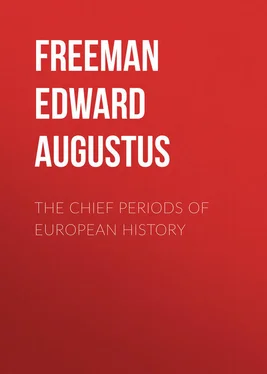Edward Freeman - The Chief Periods of European History
Здесь есть возможность читать онлайн «Edward Freeman - The Chief Periods of European History» — ознакомительный отрывок электронной книги совершенно бесплатно, а после прочтения отрывка купить полную версию. В некоторых случаях можно слушать аудио, скачать через торрент в формате fb2 и присутствует краткое содержание. Жанр: foreign_antique, foreign_prose, на английском языке. Описание произведения, (предисловие) а так же отзывы посетителей доступны на портале библиотеки ЛибКат.
- Название:The Chief Periods of European History
- Автор:
- Жанр:
- Год:неизвестен
- ISBN:нет данных
- Рейтинг книги:4 / 5. Голосов: 1
-
Избранное:Добавить в избранное
- Отзывы:
-
Ваша оценка:
- 80
- 1
- 2
- 3
- 4
- 5
The Chief Periods of European History: краткое содержание, описание и аннотация
Предлагаем к чтению аннотацию, описание, краткое содержание или предисловие (зависит от того, что написал сам автор книги «The Chief Periods of European History»). Если вы не нашли необходимую информацию о книге — напишите в комментариях, мы постараемся отыскать её.
The Chief Periods of European History — читать онлайн ознакомительный отрывок
Ниже представлен текст книги, разбитый по страницам. Система сохранения места последней прочитанной страницы, позволяет с удобством читать онлайн бесплатно книгу «The Chief Periods of European History», без необходимости каждый раз заново искать на чём Вы остановились. Поставьте закладку, и сможете в любой момент перейти на страницу, на которой закончили чтение.
Интервал:
Закладка:
How the Latin city of Rome marched to the headship of Latium, how the head of Latium marched to the headship of Italy, are matters of Roman rather than of universal history. The œcumenical calling of Rome comes upon her as soon as she has become the head of Italy, perhaps more strictly in the very moment of her becoming such. She is not fully head of Italy till she has beaten back the invader from Epeiros from the shores of her peninsula. But her war with Pyrrhos had brought her into the thick of the Greek world and all its complications. Unless we accept the tales of her earlier dealings with Massalia, Rome has not yet sought either Greek allies or Greek enemies beyond the bounds of Italy. But Greece, in the person of her foremost champion, had come to seek out Rome within those bounds. The fight of Beneventum ruled that Italy should be Italian; it ruled that no Greek power should arise in Western Europe to balance the realms of Ptolemy and Seleukos in the East. It ruled in short that the head of Italy should be Rome. The wars which Rome had waged against the Samnite and the Gaul had made her beyond all comparison the first power in Italy. The war with Pyrrhos, the war that threatened to make Italy, like Asia or Egypt, part of a Greek dominion, made her the undoubted head.
The head of Italy now stood forth as one of the great powers of the world. It marks one of the differences between the political state of those days and that of our own that Rome had no sooner undoubtedly risen to this position than she found herself engaged in a struggle, a struggle well nigh for life and death, with the other great power of the Western Mediterranean. In the modern world, whatever jealousies, controversies, wars, may arise between any of the great powers of Europe, none seeks the utter destruction of any other, none seeks the abiding weakening of any other, its degradation from the rank of a great power. But the establishment of Rome as the undoubted head of Italy, as one of the two greatest powers of the West, at once condemned her to abiding rivalry with the other power, a rivalry which might be salved over by this or that interval of peace, but which meant that, sooner or later, either Rome or Carthage must perish. We must remember that, while between any other two of the great wars of Rome there was some slight interval of peace, the war with Pyrrhos and the Italian allies of Pyrrhos was followed without any break whatever by the first war with Carthage. That war was the War for Sicily. On any theory of natural boundaries, a power that was the head of Italy might reasonably, so far as there is reason in such matters, expect to spread its dominion over the lands within the Alps, and over the three great islands which look like natural appendages to the peninsula of Italy. And a power which spread itself over the lands within the Alps, a power which from its own shores could look out on the mountains of Illyricum, could hardly expect to keep itself wholly unentangled by the affairs of the lands on the other side of Hadria. Rome then had hardly become the head of Italy before two fields of action were opened for her without a breathing-space. She had to strive with the other great power of the West, and signs were not wanting that before long her destiny would call her to mingle in the strifes of Eastern Europe also.
The Western call was the earlier and the nearer. Close on the war with Pyrrhos followed the War for Sicily, the war of more than twenty years waged mainly on the waters by the fleets of Rome and Carthage. As a war for Sicily, as one of the greatest of the many wars for Sicily, it takes its place in the long range of cycles which make up the history of that illustrious island. Rome now for the first time buckled on her harness to play her part in dealing with the Eternal Question. Was the greatest of Mediterranean islands to be a part of Europe or of Africa, to be a possession of Aryan or of Semitic man, to be the home of the gods of Alba and Olympos or of the Moloch and Baalim of the men of Canaan? The Greek had waged the warfare for ages; the fates had gone against him; the realm of Hierôn was but a small survival of the days when Sicily had come so near to being a purely Hellenic island. The calling for which Syracuse was too weak passed on to the stronger hand of Rome. Panormos, won for Europe for eleven hundred years, was no mean first-fruits of the strife. After well nigh a generation of warfare, Rome stood forth victorious, mistress of Sicily, presently mistress of Sardinia and Corsica, seized of her first provincial dominion, rich in the faithful alliance of the first and worthiest of her long line of dependent kings. The rival power came out of the strife, not crushed, hardly weakened, but driven to transfer her energies to a new sphere, to seek in a new land the means of dealing a blow at Rome in the heart of her own Italy.
The choice of that new sphere of Carthaginian energy, the exploits of the house of Hamilkar, the line of the sons of Thunder, of itself opens a new and important, though as yet a secondary, page in the history of Europe. The time has come for the most western of her three peninsulas to play its part in the general affairs of the world. But the peninsula which was not wholly Mediterranean, which had two of its three sides washed by the outer Ocean, was never to play such a part as the elder peninsulas which felt only the waters of the inland sea. A day was to come in ages still far distant when Spain should be a ruling power in Italy and in Greece. But Spain never was to be what Italy or what Greece had been, nor what Italy was to be again. For several centuries her fate was to be a great and flourishing dependency of Rome, which, when it had once fully accepted the dependent relation, was to be less disturbed either by civil wars or by foreign invasion than any other province of the West. And now her fate was a strange one, but a fate which the wonderful cycles of history brought back again after more than nine hundred years. Spain was to be as Sicily. One phase of the Eternal Question was twice to be whether the most western land of Europe should be a part of the Western or the Eastern world. Rome had to win the land from the grasp of the Phœnician; its own sons had in after ages to win it back from the grasp of the Saracen. For the moment the third of the great peninsulas was to be in turn the stronghold of either side, to be the arsenal where Carthage first gathered up her strength for the attempted overthrow of Rome, and where Rome then gathered up her strength for the more than attempted overthrow of Carthage.
The Punic Wars form a kind of episode in the history of Europe, just as the presence of a Punic people in the Western Mediterranean is of itself an anomaly and in some sort an episode. The existence of the Carthaginian power hindered what we might have looked on as the natural course of history for the three great European peninsulas. When Rome had become the undisputed head of Italy, the next growth of her power might have been looked for in the direction of the Gaul and of the Greek. The headship of Italy had been won by driving back a Greek invasion, an invasion from a Greek land within sight of Italy, and that headship might be looked on as imperfect till it was further spread over Sicily at one end and Cisalpine Gaul at the other. Sicily was at once fought for, and in the end won; but it had to be won from the intruding Carthaginian. When the first Punic War was over, the eyes of Rome were again drawn beyond the Po and beyond the Hadriatic. The conquest of Cisalpine Gaul was begun; the Illyrian wars led to the first establishment of Rome as an influence, as a power, in the Eastern peninsula. Protector, mistress in all but name, of Korkyra, Epidamnos, and Apollônia, Rome has become an element in the affairs of Greece herself as well as in those of Greek colonies in Italy, Sicily, Spain, and Gaul. She has won the jealousy of Macedonia, the good will of the free states of Greece. That is, she has taken the first steps towards bringing Greek friends and Greek enemies alike, first under her influence and then under her dominion.
Читать дальшеИнтервал:
Закладка:
Похожие книги на «The Chief Periods of European History»
Представляем Вашему вниманию похожие книги на «The Chief Periods of European History» списком для выбора. Мы отобрали схожую по названию и смыслу литературу в надежде предоставить читателям больше вариантов отыскать новые, интересные, ещё непрочитанные произведения.
Обсуждение, отзывы о книге «The Chief Periods of European History» и просто собственные мнения читателей. Оставьте ваши комментарии, напишите, что Вы думаете о произведении, его смысле или главных героях. Укажите что конкретно понравилось, а что нет, и почему Вы так считаете.












